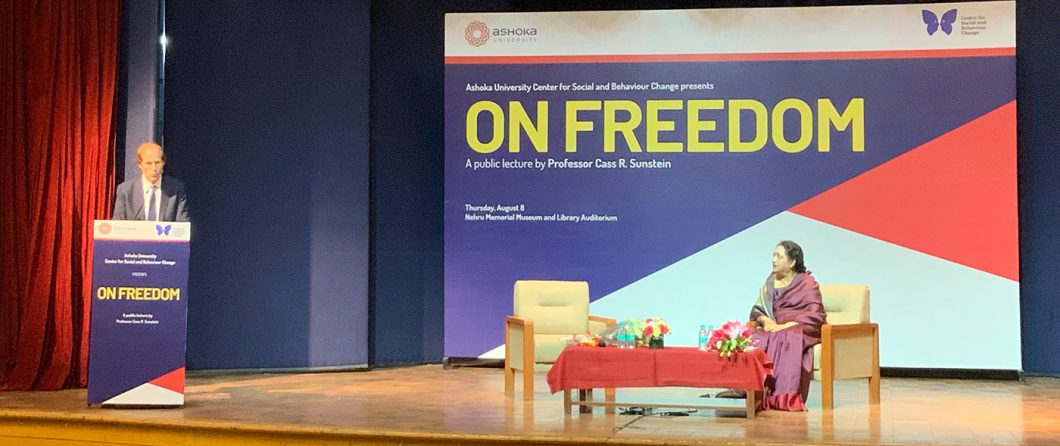
“On Freedom” – a public lecture by Dr. Cass R. Sunstein

On 8th August, 2019, ISPP Public Policy Scholars got the opportunity to listen and interact with renowned behaviour economist and Harvard Professor, Professor Cass Robert Sunstein. Professor Sunstein was on a trip to India to initiate the “Nudge‟ unit at NITI Aayog.
Put simply, a “nudge‟ is a subtle push for an individual to follow a certain set path. Such a concept is widely used in marketing and sales. For instance, the number of restaurants, coffee shops, cafes outside a theatre; the incentive of “cashback‟ used by digital payment companies such as Paytm and PhonePe; big cards announcing discounts on sales in shops – all edging the subject to buy in to something he/she doesn‟t necessarily require. The unit at the NITI Aayog is established with the motive of studying how behavioural economics can enhance the incentivization of government schemes/ programmes.
Such a specialised office was first set up by Britain (Behavioural Insights Team; estd. 2010), after which United States, Australia, Canada, Netherlands and Germany followed suit. Soon, global financial institutions such as the World Bank and the IMF apart from Indonesia, Peru, India, Singapore started exploring the concept further.
Professor Sunstein enthralled the audience by commencing his talk with a famous quote by Mahatama Gandhi,
“In a gentle way, you can shake the world.“
Nudge units facilitate change and when it comes to the topic of change, we can find a plethora of opinions, each no less important than the other. In the book “Nudge‟ co-authored by Professor Sunstein and Richard Thaler, the authors guide us through a distinct process to induce change in the society, using a
behaviour centric approach.
Something that always affects our actions is what Professor Sunstien called “present bias”. He engaged the audience with a thought experiment, in which he asked the audience to imagine themselves in their favorite place, a month from now. Once we had formed an image in our mind, he asked us to further clear our minds, and imagine ourselves a year from now. He identified that the people who could not imagine themselves after such a period of time tend to have a “present bias”, i.e. a disposition to be focused on the short-term pleasures, without paying heed to any long-term risks of the same.
Professor Sunstein claimed that people also tend to be “unrealistically optimistic”. Elaborating the same, he mentioned that 90% of drivers believe that they are safer than the average driver; smokers tend to have an accurate sense of statistical risks but they themselves believe that they are less likely to suffer from lung cancer than the average non-smoker – they know the statistics, but they think “that’s statistics, that’s not me!” Such ignorance germinates from individuals and infects the masses and the society at large. This ignorance can also be found not only in our vision of our future selves, but also in our perception of different classes of society.
As members of the privileged class of the society, we often hear the irritant rhetoric – why don‟t the poor do something to change their condition? Professor Sunstein brought this inequality to attention by echoing Esther Duflo from her book Poor Economics –
“If we do nothing, then we are on the right track and if they do nothing, they are on the wrong track.“
It is no doubt that compared to the lower strata of the society, the upper and middle class need to put relatively much less efforts to reach a similar result. Keeping this in mind, people need to be guided towards certain pathways for their own benefit. This is the concept of “navigability“, as introduced by Professor Sunstein.
He claims that we can all agree with two statements, namely:
“1. It is not a lot of fun to be lost
2. It is really nice to be able to get where you need to go.”
Expanding on this, he emphasized on the need for “steering people in the right direction“. Navigability involves small interjections, which guides people towards their desired way, while still preserving their freedom of choice (On Freedom, Cass R. Sunstein).
The Robert Walmsley University Professor referred to the right and wrong tracks as being part of the human condition generally. The two paths culminate and tell us about what it means to be unfree. To explain this, he engaged the audience in yet another thought experiment inspired from Daniel Kahneman‟s book Thinking Fast and Slow. The purpose of this experiment was to illustrate to the audience the two very different systems of thought processing, namely – System 1 and System 2.
System 1 thinking is usually instinctive and emotional whereas,
System 2 is slower, more deliberative and logical. Analysing these two systems of thought processes, he (and Thaler) have crafted the concept of “choice architecture”.
Choice architecture, a juxtaposition of words choice and architecture (as highlighted by Mrs. Malabika Sarkar), is a concept of designing different ways in which choices are presented to people. This in turn impacts how people make decisions. Choices made by humans, complex and dispersed as they are, govern almost all aspects of our life. And it is through these choices – Professor Sunstein completed the beautiful, consistent arch of his talk – by reiterating that we can actually, gently, shake the world.
Author(s): Arindam, Vagisha, and Shefali


